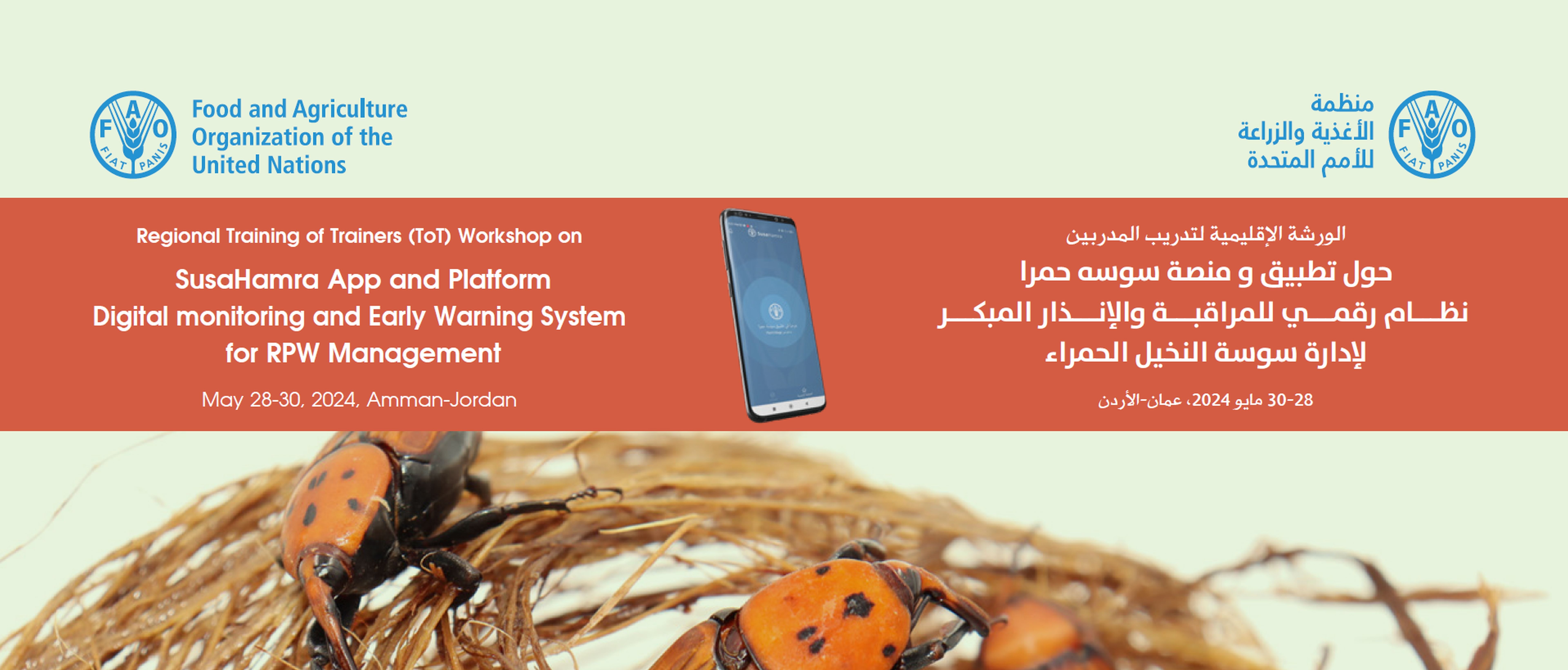Regional Training of Trainers (ToT) Workshop on the Susa-Hamra App: a digital system for monitoring and early warning for Red Palm Weevil (RPW)
Amman (Jordan), 28/05/2024 - 30/05/2024

Red Palm Weevil (RPW, Rhynchophorus ferrugineus) is a key transboundary pest of date, coconut, and ornamental palms that originates from South Asia and is rapidly spreading throughout the world. In the Near East, RPW is causing widespread damage to date palm that impacts production, farmer livelihoods, and the environment. RPW is a quarantine pest in the Near East and North Africa (NENA) countries as well as in Latin America and it is the object of emergency measures in the European Union. Weak quarantine procedures and difficulties in the early detection of RPW-infested plant materials have contributed to its rapid spread. RPW has not been effectively managed despite efforts and resources provided by countries and organizations. There is broad recognition that RPW challenges must be addressed urgently at national, regional, and global levels, and enhanced solidarity and cooperation between countries and regions is required to harmonize monitoring and control strategies.
FAO developed the regional Trust Fund program for RPW eradication in the NENA region as one of the most affected regions. The RPW eradication “GCP /RNE/012/MUL” is a five-year project that aims to contribute to the ongoing efforts for the eradication of the RPW in the Near East and North Africa (NENA) region. The project is designed to develop the necessary strategies, plans, tools, and technologies to assist NENA countries in sustainably managing the RPW through three major thematic areas: i) research; ii) capacity development, and iii) transfer of knowledge and technology. To implement these thematic areas, five technical working groups (TWGs) were developed, and 15 Work Packages (WP) were prioritized to focus on i) improving policies and phytosanitary regulations, ii) supporting research and innovative approaches for monitoring and sustainable management methods; iii) socioeconomic impact assessments; iv) supporting the capacity development and enhanced farmers’ and other stakeholder’s involvement; and v) facilitating the transfer of knowledge and technology.
The Rationale of the Workshop
To improve the monitoring of RPW, FAO developed a new monitoring system that will include a mobile application for collecting data from the field through visual inspection and checking pheromone traps in addition to a cloud platform for processing, analyzing, and mapping the collected data. The beta version of the mobile application” Susa-Hamra App” was released at the end of 2018 and the field use of the system was officially launched in December 2023. The system was presented and validated to the Maghreb countries in a previous workshop. Tunisia currently adopted the new digital tool as a national system to monitor and survey the RPW in the affected areas. Under the RPW eradication “GCP /RNE/012/MUL program, the Susa-Hamra digital system will be officially launched and deployed in other NENA countries through the ToT training programs.
Workshop Objectives
To enhance the RPW management national strategy through improving RPW monitoring activities.
To officially launch the Susa-Hamra system as an official system for monitoring RPW in Mashreq and Gulf countries.
To strengthen the capacities of officials in the Ministry of Agriculture and build a wide pool of expert RPW monitoring trainers.
Workshop Approach
The ToT workshop is scheduled to take place as an in-person meeting, with a two-day scientific program and a one-day field visit. Two ToT workshops will be organized:
- for Mashreq countries (Egypt, Iraq, Jordan, Lebanon, Palestine, and Syria) in Amman, Jordan from 28-30 May 2024; and
- for Gulf countries (Oman, KSA, UAE, Qatar, Kuwait, Bahrain, and Yemen) in Muscat, Oman from 3-5 June 2024.
Target Participants
The target participants of the workshop will include government representatives as the national focal points of RPW and Farmer Field Schools (FFS) coordinators in the selected countries, inspectors, and agricultural specialists with good experience in the field of RPW monitoring, surveillance, and management. Overall, the workshop is expected to include up to 30 participants.
FAO-RNE will invite NENA member countries through FAO country offices to nominate five participants for in-person participation as per below:
- (1) nominee representing the national RPW focal point or the national FFS coordinator for the FAO program of RPW “GCP /RNE/012/MUL" in his/her country
- (3) nominees representing inspectors, agricultural specialists, and extensionists, who have a role and direct involvement in RPW monitoring, surveillance, and management in the RPW-affected areas in his/her country.
- (1) a nominee for data validation with a good command of data processing, and data uploading, and skilled in using mobile applications.
Expected Outputs of the Workshop
Around twenty-five to thirty participants from Mashreq countries or Gulf countries will strengthen their knowledge and technical experiences in the following aspects.
- RPW visual inspection and trapping protocols,
- A detailed hands-on training on the use of the SusaHamra mobile application,
- Data Validation process in the PlantVillage platform, and the use of the SusaHamra Platform.
Planned Activities
- Setting up the mobile devices (25 smartphones) that will be used for collecting field data from the visual inspection as well as pheromone traps.
- Training the technical inspectors on the visual inspection of both ornamental and date palms and trap management.
- Training the technical inspectors on the use of SusaHamra for collecting data and agreeing on the inspection protocol and the timeframe.
- Field visit to an infested location in the country of the workshop.
Expected Outcomes of the Workshop
- A new digital RPW monitoring system at the national level is deployed.
- The national strategy for managing RPW is improved and the spread of the RPW to new areas is limited.
- The infestation of the RPW and the loss of the infested palms are minimized.
- Cross-country experiences are exchanged.
